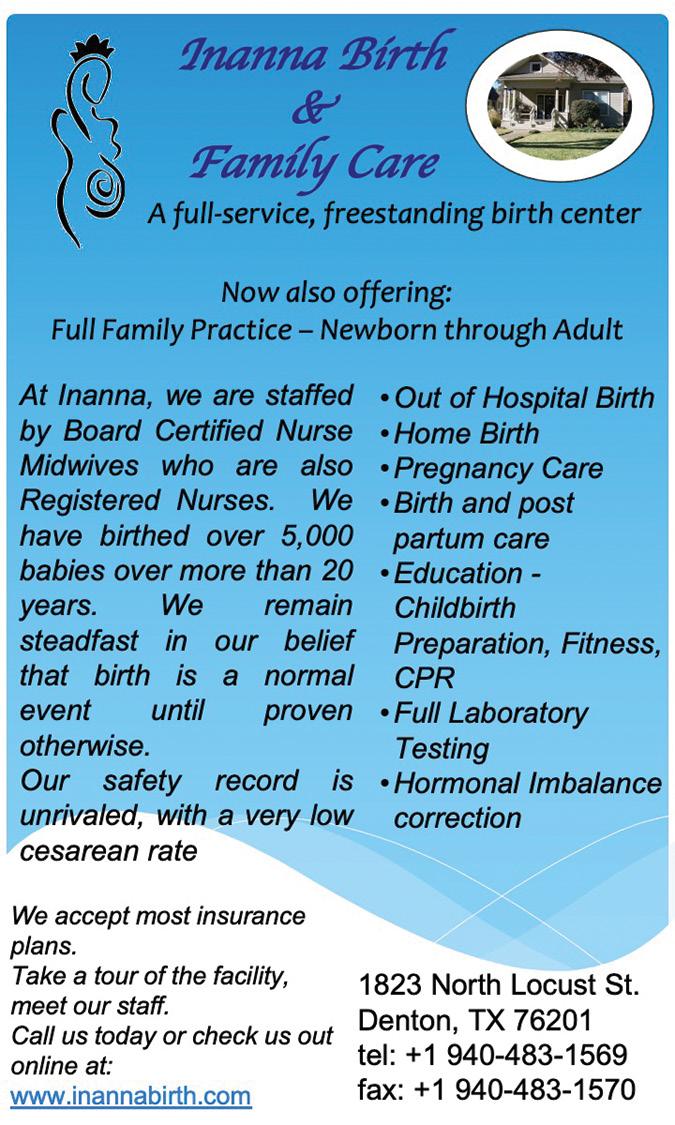
4 minute read
Not So Sweet Emotions
from DFWChild Baby 2020
by DFWChild
feeling bad postpartum? you’re not alone i t’s 3am. Your baby is crying (or is that you?). Blearily, you go to feed for what seems like the 87th time today, while your own stomach growls, the pile of laundry looms threateningly, and you try not to think about the skyscraper in your kitchen sink. And when was the last time you showered?
No wonder new moms feel overwhelmed. Besides recovering physically, they’re dealing with a huge life change and what seems like the loss of their old selves. “Mothers tend to feel a flood of mixed emotions, even mothers who were super excited about having a baby,” explains Dr. Aparna Iyer, a Frisco-based psychiatrist with a special interest in pregnancy and postpartum mental health. “Sometimes that can be pretty uncomfortable to sit with.”
Advertisement
So if you aren’t feeling like sunshine and daisies, you aren’t alone. The first few weeks after giving birth, many moms experience the baby blues. “You find yourself crying and you don’t even know why, you may feel overwhelmed, or you may feel like, ‘Why in the world am I a mother? I’m not a very good mom,’” says Tania Lopez, certified nurse-midwife at UNT Health Science Center Healthy Start. “The hormones are changing, and those are normal feelings.”
If those feelings don’t go away, or if they suddenly appear weeks or months after giving birth, then you’re still not alone.
New moms (and dads!) can face postpartum mental health problems, including depression, anxiety, obsessive-compulsive disorder, post-traumatic stress, and psychosis—often in combination. Women with a history of mental health issues are at greater risk, but these conditions can afflict any new mom, especially if she has a traumatic delivery or things don’t go as planned regarding the birth, bonding or breastfeeding.
Ten to 20 percent of moms experience postpartum depression, and it’s likely underreported. After all, it can be hard for newly minted moms to admit they’re feeling inadequate or less than joyful.
“You’re thinking to yourself, ‘I’m supposed to be happy, and I’m not.’ And so that starts the spiral of feeling guilty,” Lopez says. “Sometimes it’s seen as a sign of weakness, like, ‘I’m not tough enough; I’m not strong enough to be a mom because I’m feeling this way.’”
No matter what your critical inner voice says, it’s crucial to seek help from your provider if you’re not feeling good. The pros are equipped to diagnose your symptoms and help you get better through counseling or medication. “Treatment is actually very, very effective,” says Iyer.
Besides watching for red flags, is there anything else you can do to promote your own mental health after giving birth? The typical self-care go-to’s (getting plenty of rest, exercising, eating regular meals…) are pretty incompatible with new motherhood. One of the best ways to take care of yourself is to ask friends, family, neighbors or professionals to pitch in so that you can shower or sleep occasionally. Repeat after me, Mama: It’s OK to ask for help.
You can find support and solidarity on the web too. Both Lopez and Iyer recommend Postpartum Support International (postpartum.net), which has a helpline, resources and support groups. “When you hear other women are having these same thoughts or these same reactions, it helps you to feel not so isolated,” says Lopez. ●
Mental Health Checklist Here are some questions to ask yourself during the first year after baby’s birth. Aparna Iyer and Tania Lopez say any of these symptoms could indicate a mental health condition that needs treatment:
Are you struggling to bond with your baby?
Are you struggling to connect with your partner?
Have you lost your appetite—or, conversely, are you eating way more than usual?
Are you crying a lot?
Are you irritable or having mood swings?
Do you feel sustained sadness or hopelessness?
Do you frequently feel guilty, ashamed or inadequate in your role as a mom?
Do you have repetitive thoughts that harm is going to come to you or your baby?
Are you frequently anxious or worried?
Have you had panic attacks?
Do you feel like you can’t or don’t want to take care of your baby?
Have you had thoughts of harming yourself or harming your baby?
If you said yes to either of the last two, seek help right away from a provider you trust.
Maybe you said yes to only one or two questions, or you’re still in those first few weeks when the baby blues are common—that doesn’t mean you shouldn’t tell your provider about your symptoms. “If you don’t feel good, there is nothing wrong with expressing that concern to your practitioner to see what their opinion is,” says Iyer. Helping children thrive through integrative, natural and holistic pediatric care
Our passion is integrative pediatrics—a combo of traditional, complementary, alternative and holistic approches to provide the most effective and least invasive way to treat your child. NCP is vaccine-friendly.
Christie Potter, APRN, CPNP-PC Annalise Clayborne, APRN, CPNP-PC Rebecca Greco, APRN, CPNP-PC Eileen Yearwood, APRN, CPNP-PC
3535 Victory Group Way, Suite 305, Frisco, TX 75034 972-324-3480 // 877-637-1611 info@naturalchoicepediatrics.com NaturalChoicePediatrics.com









